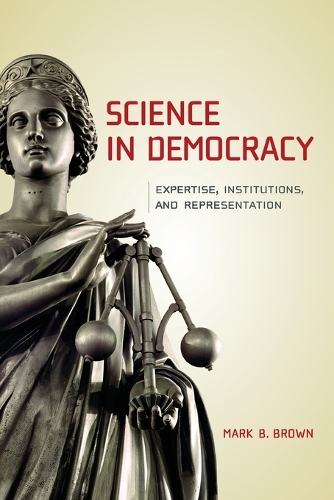
Science in Democracy: Expertise, Institutions, and Representation
(Paperback)
Publishing Details
Science in Democracy: Expertise, Institutions, and Representation
By (Author) Mark B. Brown
MIT Press Ltd
MIT Press
14th August 2009
United States
Classifications
Tertiary Education
Non Fiction
321.8
Winner of Honorable Mention, 2010 First Book Award, given by the Foundations of Political Theory section of the American Political Science Association 2010
Physical Properties
Paperback
370
Width 152mm, Height 229mm, Spine 16mm
499g
Description
An argument that draws on canonical and contemporary thinkers in political theory and science studies-from Machiavelli to Latour-for insights on bringing scientific expertise into representative democracy.Public controversies over issues ranging from global warming to biotechnology have politicized scientific expertise and research. Some respond with calls for restoring a golden age of value-free science. More promising efforts seek to democratize science. But what does that mean Can it go beyond the typical focus on public participation How does the politics of science challenge prevailing views of democracy In Science in Democracy, Mark Brown draws on science and technology studies, democratic theory, and the history of political thought to show why an adequate response to politicized science depends on rethinking both science and democracy. Brown enlists such canonical and contemporary thinkers as Machiavelli, Hobbes, Rousseau, Dewey, and Latour to argue that the familiar dichotomy between politics and science reinforces a similar dichotomy between direct democracy and representative government. He then develops an alternative perspective based on the mutual shaping of participation and representation in both science and politics. Political representation requires scientific expertise, and scientific institutions may become sites of political representation. Brown illustrates his argument with examples from expert advisory committees, bioethics councils, and lay forums. Different institutional venues, he shows, mediate different elements of democratic representation. If we understand democracy as an institutionally distributed process of collective representation, Brown argues, it becomes easier to see the politicization of science not as a threat to democracy but as an opportunity for it.
Reviews
Rather than adding one more demonstration of science's intertwinement with politics, or one more call for increased public participation in science policy, Brown proposes a rethinking of democratic institutions [T]his book should be considered essential reading for those interested in ongoing discussions about the relationships between science and politics.
-- R. Holifield * Contemporary Political Theory *Science in Democracy presents a useful collection of arguments for anyone concerned with the politics of science Democratizing science, [Brown] suggests, is less a matter of increasing public participation than of supporting a diverse ecology of modes of political representation.
-- A. Moore * Social Studies of Science *Not only does [Brown] grapple with the complex values that are required by democratic representation; he also looks at how various institutions can and do embody those values and how we might do better His book is clearly a must-read for those engaged in this issue.
-- M.J. Brown * Isis *Brown...fights fire with fire, in the manner of Madison's treatment of factions: accept the politicization [of science] but fix the politics by creating a complex 'framework of democratic representation' throughout. His recommendations are quite detailed, and based on a deep, enjoyable analysis.... This is, in fact, a thinker's book, and one closes it with the thought that 'well, it just might work.' Highly recommended.
Author Bio
Mark B. Brown is Associate Professor in the Department of Government at California State University, Sacramento.
